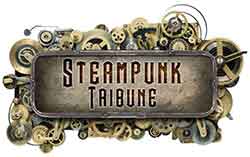Oil canvas paint in 1899 of Rudyard Kipling by Sir Phillip Burne-Jones
Rudyard Kipling
Born 1865, Died 1936
Age 42, 145 lbs. A middle-aged Englishman with a mustache and thick glasses, probably holding a cigar.
Advantages: Language Talent, Reputation (Noble prize winning author), Wealthy
Disadvantages: Addiction (Tobacco), Bad Sight (nearsighted), Insomniac, Reputation (from the political left, as a reactionary), Sense of duty (family)
Quirks: Believes he has occasional psychic experiences, “Gets even”, Loves to travel, Freemason but not Christian, Sense of Privacy
The outward facts of Kiplings life are well known, as he was a very public figure, but how he felt about them was largely concealed. He disliked biographers and biographical criticism, which he referred as “the higher cannibalism.” Some of his feelings can be gathered from his poetry and fiction, but not the literal circumstances of his life that produced them.
Biography
Queen Victoria was the head of the British Empire, but Kipling was its voice.
Born in India, Rudyard Kipling and his younger sister were taken in 1871 to board with a family in England. Kipling was miserable there and fled into reading to escape, damaging his eyesight; he also gained a lifelong revulsion against the idea of eternal punishment after repeated warnings about the damnation that awaited him. His adolescence, spent at boarding school preparing boys for military service, was happier.
In 1882, he returned to India and a job on a very small newspaper, which gave him an outlet for his fiction and poetry. The publication of a collected editions made him famous and allowed him to return to England. A subsequent world tour took him to the United States, where he married Caroline Balestier and settled on her property in Vermont. He wrote some of his major works there, including the Jungle Books and Kim, but quarreled with the neighbors and eventually, in 1902, moved to Sussex, in England.
Photo in 1907 after winning the Nobel Prize
He received the Nobel Prize for literature in 1907, a controversial award because of his outspoken political views, but is said to have declined other honors such as the Order of Merit, and the role of Poet Laureate. He supported universal military service for men, spoke out for the British side in the Boer War, and was bitterly hostile to the Kaiser, especially after the death during World War I of hi sonly son, John, who had enlisted underage. One of his two daughters also died young. Kiplings later life was secluded and produced only a small volume of writing short story collections and his autobiography, his last book, published posthumously in 1937.
Sepia-toned 1926 photograph
Kipling in History
Kipling is historically important not for what he did, but for what he expressed: the viewpoint of British Imperialism at its historical high point. His political outlook made him unpopular with other writers, especially in his later life; even admirers such as Auden, Eliot, and Orwell felt the need to apologize for him. Some have found a streak of brutality, deeper than the patriotism. The struggle of the Third world nations for independence put him into to further disfavor as a symbol of white arrogance. In fact, his early works show a fair amount of respect for non-European cultures, although he does seem to become more harshly reactionary in his later years. As those conflicts recede into the past, a more detached appraisal of his work may reveal the poet hidden within the propagandist.
Newspaper image of Kipling
Encountered
Kipling is not always easy to meet; his wife is very protective of his privacy. He may speak at patriotic events or schools, or be met at one of his clubs in London, though he goes there less than he used to. He will eagerly talk about work his or anyone elses and may express his distaste for liberalism and socialism if sufficiently provoked. Getting him to reveal anything more personal will take patience and tact. Even with people he trusts, there is a great deal he will not say, though he may allude to it.
He is unusually religiously tolerant for his era, writing sympathetically about Christianity, Islam, and Buddhism; many of his writings hint at a belief in reincarnation. His political views are and odd combination of libertarian individualism and patriotic imperialism (in the sense that the imperialist has a civilizing duty), both falling out of favor in the 20th century.
Further Reading:
Kipling, Rudyard: Kim
Kipling, Rudyard: The Jungle Book
Kipling, Rudyard: Something of Myself
Wilson, Angus: The Strange Ride of Reared Kipling: His Life and Works
Stoddard, W (1999) – Gurps Who’s Who I, pg. 112-113, SJG:Austin[edited for removal of game specific content]
Online Resources:
http://en.wikipedia.org/wiki/Rudyard_Kipling
http://www.online-literature.com/kipling/
http://www.kipling.org.uk/
http://www.nobelprizes.com/nobel/literature/1907a.html
http://www.victorianweb.org/authors/kipling/index.html



